Lisa Appignanesi
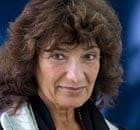
The term "non-fiction" has always seemed to me a strange sort of negative beast, as if fiction, the making up of stories, always came first and was the primary form of putting words together. It's a catch-all category, of course, and makes about as much sense as defining all prose as "non-poetry". It's also peculiar to English classification. The French speak of "essais", which at least has the grace of harking back to Montaigne and implying an attempt to think about the world.
In my writing life, I seem to have navigated an odd course between fiction and its negation, always half-wishing when I'm immersed in one that I were embarked on the other. I want the free flight of story when I'm hunkered down in facts and wish for a character who could offer a statement contradicted by another character. On the other hand, when I'm writing fiction, I often enough find myself wishing that I could fill the blank page with some meaty matter that didn't demand the difficult act of creating a scene that then had to leave most of the matter out in order to live. Non-fiction depends on remembering your research, fiction on forgetting it.
Over the years I've noticed that my non-fiction has learned not a little about storytelling, narrative energy and scene-setting from my fiction and has been enlivened by it. As I was pondering the writing of my family memoir, Losing the Dead, I realised that "voice" was as crucial here as in fiction. I just hadn't been able to write the memoir, though all the research was in place, until the voice of the book came to me. It's my own, of course, but translated into words ownership is always a creation.
Gillian Beer

Sometimes I think I write for the 20 minutes of euphoria when a piece is finished, and that might explain why I like writing essays (20 minutes' reward for 7,000 words, instead of the delayed gratification of 80,000 book-length). But that's not all of it. I love the immersion of writing and the curiosity of research. It's strange to enter another person's mind and discover there further reaches of time, different rhythms of thinking, new kinds of knowledge and emotions grappling the writer, forcing form, held by form.
I'm fascinated by how we come to have new ideas. How do writers turn language, which is communal and soaked in history, in a new direction that can encompass thoughts quite out of kilter with the society's current assumptions? That's one reason why I've spent so much time reading and thinking about Darwin's language. Darwin worked with an open, non-technical vocabulary: the great family, the struggle for life, the face of nature, natural selection, contingency, imperfection. This open language generated contradictory stories in which leftover elements in metaphors began to work out new narratives: the descent of man, the ascent of man, the interdependence of all forms of life, the struggle and destruction. To understand how he controlled the ebullience of his imagination, I had to learn much about 19th-century habits of thought among theologians, natural historians, political theorists, humorists, economists and family dynamics. The thick present of the past is what I most try to communicate when I write. These people were as alive as we are. And writing allows some of that experience and that thinking to survive, close up to the present reader.
William Dalrymple
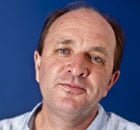
I think it is absolutely vital to scribble constantly: not full sentences, so much as lists of significant detail – the colour of a hillside, the shape of a tulip, the way a particular tree haunts a skyline. Creating fine prose comes later – back at home at the keyboard. The travel writers I really admire all keep exceptionally detailed notes: Theroux, Thubron, Chatwin. If 19th-century travel writing was principally about place – about filling in the blanks of the map and describing remote places that few had seen – I think that some of the best 21st-century travel writing is about people: exploring the extraordinary diversity that still exists in the world beneath the veneer of globalisation. The second golden rule is to enjoy yourself. If you lose interest in your own journey, the reader can tell immediately and soon loses interest too. The third golden rule is to be open to the unexpected. In 1990, I went up to Simla to interview two old stayers-on who had lived in Delhi in the 1930s and would, I hoped, be able to re-create that lost world of the Raj. In the event, I arrived 10 years too late: both had gone senile and now imagined they were being persecuted by Jewish prostitutes who popped up from beneath the floorboards to put dope in their food. I failed to get anything at all useable about 1930s Delhi, and left disappointed that I had wasted an afternoon. It was only when I told my wife, Olivia, that she pointed out that the bizarre afternoon would make an excellent sequence in itself. It became one of my favourite sections in City of Djinns.
Philip Hoare
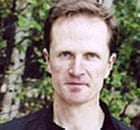
A couple of years ago, at the back of a cupboard, I found a journal I'd written when I was in my mid-teens. It was a hardback notebook, brought back by my father from his job as a cable tester in a factory in Southampton. I'd filled it with writings and paintings, testaments to my teenage obsessions. On one page, I'd painted a killer whale; on another, I'd written an adolescent fantasy about a dandy. Discovering this book after four decades was a shock. Each page seemed to predict my future "career", like an Ordnance Survey map of my imagination.
I wrote my first book, a biography of the aesthete Stephen Tennant, because I wanted to enter his world, albeit at one remove. The brightest of the Bright Young Things, patron of Cecil Beaton and lover of Siegfried Sassoon, in 1986 Tennant was still living in the Wiltshire manor house in which he was born 80 years earlier. I'd made three pilgrimages to his door; only on the last was I finally conducted by the housekeeper through rooms filled with polar bear-skin rugs, multicoloured fishing nets and, strewn across the floor, the manuscript of Lascar: A Story of the Maritime Boulevard, a salty tale of tars and tarts destined never to be finished, since once the author had reached the end he just began all over again.
That day, at Tennant's bedside, when he held out his beringed hand in a darkened room filled with the memories of his past, was the spark that impelled me to re-create his life. I've since come to realise that all my books owe their genesis to the effect of a single day, encounter, event. Fast-forward 20 years to another memorable encounter, this time off the coast of Pico in the Azorean archipelago, where, after five years' pursuit of the cetaceans that had become my new obsession – yet were one of my oldest – I came face to face with a sperm whale. Possessed of the largest brain in the animal kingdom, as well as the largest teeth, this great predator swam directly towards me as I snorkelled in the three-mile-deep ocean.
I felt utterly terrified. The animal did not appear to stop. I imagined it was either going to hit me, or open its huge jaws at the last moment. Then I felt – rather than heard – the whale's echo location moving through my body like an MRI scan – click–click–click. It was using its sonar to discern what kind of creature I was. How ironic: I'd spent five years trying to describe whales, and now here was a whale trying to describe me. The result, my most recent book, Leviathan, or The Whale, was as much an attempt to map an obsession as my first.
Robert Macfarlane
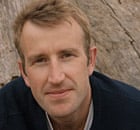
Writing is a craft. It is learnt in the way that cabinet making is learnt, or a musical instrument is learnt, which is to say by practice and the often effortful acquisition of technique. Richard Sennett, in his brilliant book on the idea of craft, estimates that it takes 10,000 hours to learn to play the violin well or to make an admirable cabinet. It takes even longer to become a writer, because before you become a writer you must first become a reader. Every hour spent reading is an hour spent learning to write; this continues to be true throughout a writer's career. Reading bad writers can be as useful as reading good ones. To continue the cabinet-making analogy, reading good writers shows you how to achieve the verbal equivalent of the tongue-and-groove joint, the well-bevelled edge, the countersunk screw, the mahogany inlay or the beeswax polish. Reading bad writers, you see how the chisel can leap and gouge the wood, how joints can be left unflush and how hinges can creak.
You don't have to read within your tradition or form, of course. JG Ballard, for instance, read almost no fiction, preferring what he memorably called the "grey literature" of technical manuals, medical journals and police reports. I like to read as much as I can from the tradition in which I supposedly work. All of the books in my writing room are either travel literature, or nature writing, or a mix of the two. On the lower shelves, within grab-able reach, I've got my favourites: Jonathan Raban, Italo Calvino, Rebecca Solnit, Antoine de Saint-Exupéry, Hugh Brody, Annie Dillard, John Muir, Gretel Ehrlich, Tim Robinson, JA Baker, Barry Lopez …
It's these last two writers who have influenced me more than any others: Baker, author of The Peregrine (1967), and Lopez, whose masterpiece is Arctic Dreams (1984) but whose essay collections Crossing Open Ground and About This Life are also magnificent. In The Peregrine I saw how to describe the rapid actions of nature, and I experienced the power of Baker's metaphors: what an early reviewer called their "magnesium-flare intensity". Lopez's hymn to the Arctic revealed to me the possibility of entwining cultural history, anthropology, travelogue, science and elegy. Lopez also convinced me that lyricism is a function of precision – and that exact and exacting attention to the natural world is a kind of moral gaze.
Sara Maitland
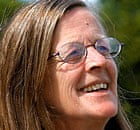
If you are a journalist, or historian, you are supposed to write only facts – externally verifiable, demonstrable realities. You are not allowed to make anything up. If you are a fiction writer, you are meant to make things up. Even if you are a historical novelist, or in some other way your story is grounded in "real" events, you would be selling your readers short if you did not make anything up.
This is not a difference between truth and lies, it is about different sorts of truth. Readers know the difference, and so do publishers, booksellers and jacket designers. Sometimes, though surprisingly seldom, the cover of the book will spell it out: under the title will be the phrase "A novel". Usually this is not necessary. A whole set of codes guide us in working out what we are reading, and we agree, so to speak, to accept whichever kind of truth we are being offered.
But with literary non-fiction these rules are far less clear. There are some conventions to assist the writer – for example, we are allowed to "invent" direct speech. In a memoir it is completely impossible to remember accurately what a particular person said 20 years ago, but "invented" conversations in direct speech are permitted, to give life and energy to the story: no one expects these to be "quotations" in the journalistic sense.
There also seems to be an agreement that, at least in certain circumstances, you can compress time to make a tidier story. This happens a lot in "nature writing". In her wonderful Pilgrim at Tinker Creek, Annie Dillard arranges her chapters into the shape of an unfolding year. We know for a fact that she spent three years in her valley, but we do not mind that three winters are merged into a single one.
But often it is not clear. In creative non-fiction, writers are walking a delicate boundary between the two sorts of truth. Film has found a solution to this problem: "Based on a true story," the advertisements say boldly. Perhaps writers of non-fiction need to claim that freedom too. As it is, we often have to lie in order to tell the truth.
Caroline Moorehead

One of the worst fears of my life is that, between them, the internet, microfilm, scanner, email and Kindle will, gradually and inexorably, do away with one of the great – perhaps the greatest – of the non-fiction writer's pleasures: life in the archives. Nothing has ever given me more delight than the buff folder, slid across a desk, full of mysterious promise and unimagined secrets. A never-before-seen letter? A remarkable discovery? The answer to some perplexing riddle in a person's life? It hardly matters. What counts is that delicious moment when the folder arrives and you take it in your hands and gently, slowly, pull back the flap.
I have looked at papers in the vaults of French mansions, in the attics of châteaux in Belgium, in libraries both large and small in Washington, Rome, Paris, Bordeaux, Amiens, Albany, Bamako, Turin, Brussels and Arolsen. I have rifled through cupboards and lofts and trunks in shuttered holiday cottages, in the manuscript sections of historic houses and in school libraries. But one archive stands out for me as the single happiest working experience of my life.
In 1989, I was asked to write a history of the International Committee of the Red Cross, the guardian of the Geneva Conventions and the arbiter of the behaviour of nations in wartime. The ICRC, founded in 1863, run entirely by the Swiss and based in Geneva, has always been a famously secretive institution. At the end of the 1990s, its archives remained closed. Before taking on the book, I visited Geneva and asked whether I might read in their archives. The reply was non-committal: the request needed to go before the board. Foolishly assuming this meant yes, I set about my initial researches. From time to time, I asked how soon I might begin work in Geneva. Not yet; soon perhaps, sometime. The months passed, then a year, then another. Fortunately, there were enormous numbers of documents that were not in the archives, but there were still questions that I was desperate to answer.
One morning, while I was reading in the library of the ICRC, a man appeared at my desk. "You may enter the archives," he announced, with great solemnity. "Last night, we voted to open them to researchers. You can be the first." The archives consisted not of a single room but of an entire floor: 130 years of papers, reports, documents, the records of missions, all immaculately catalogued, a vast and meticulous chronicle of war. My first reaction was one of horror.
But, having been at work for over three years, I knew now what I was looking for. I wanted confirmation of episodes I only had references to, of deals I dimly understood. I wanted to know and understand why certain things had happened.
It was midwinter and snowing hard. They gave me a key. I arrived every morning at six, walked through the deserted building and into a small office they had set aside for me, where I found the papers I had requested the night before. All day, until late at night, I read. I have never felt happier.
Francis Spufford
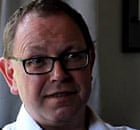
It's always struck me as unfair that writing has so little sensation when it's going well. When it's going badly, then you feel it: there's the gluey fumbling of the attempts to gain traction on the empty screen, there's the misshapen awkwardness of each try at a sentence (as if you'd been equipped with a random set of pieces from different jigsaws). After a time, there's the tetchy pacing about, the increasingly bilious nibbling, the simultaneous antsiness and flatness as the failure of the day sinks in. After a longer time – two or three or four or five days of failure – there's the deepening sense of being a fraud. Not only can you not write bearably now, you probably never could. Trips to bookshops become orgies of self-reproach and humiliation. Look at everybody else's fluency. Look at the rivers of adequate prose that flow out of them. It's obvious that you don't belong in the company of these real writers, who write so many books. Last, there's the depressive inertia that flows out of sustained failure at the keyboard and infects the rest of life with grey minimalism, making it harder to answer letters, return library books, bother to cook meals not composed of pasta. All vivid, particularised sensations, familiar from revisiting though somehow no less convincing each time round.
But there's no symmetrical set of good feelings when the work goes well. I find that hours pass without my being aware of myself enough to be in the business of having sensations; at least, of having any marked, distinct ones. It isn't just that the dyer's hand is stained the colour of what it works on. The dyer's elbow follows it in, the dyer's arm, the dyer's whole body: plop into the vat, to disperse into my attention to the thing being made. When things are going right, almost all I notice is the fiddly half-created structure of the writing, with all the mutual dependences of the pieces of it upon each other, including the delicate dependence of written parts upon parts not yet written, and vice versa; and the whole thing in motion, or at least in a kind of state of responsiveness, ready to flow into new positions and new configurations as the possibilities alter. To try to attend to my own state of mind while this is happening would be to throw myself abruptly out of it, back to a place where there's nothing to feel but that I'm cold from sitting still so long, and wouldn't mind visiting the cottage cheese pot in the fridge, with a teaspoon. So far as I can look at my own mind at all, it is in a state of flow mirroring the responsive flux I feel in the writing. What I know, from a thousand books read and conversations had, works itself together as if by itself; what I need next comes to hand without being forced, ready to be turned, examined, compared, remoulded, adjusted, smoothed until it aligns itself in parallel with the other pieces of what seems at this moment to be the design.
Why do I write? From selfishness. Because this state of liquefied, complex concentration, however faintly and dimly I'm able to perceive it, is the greatest pleasure I know.

Comments (…)
Sign in or create your Guardian account to join the discussion